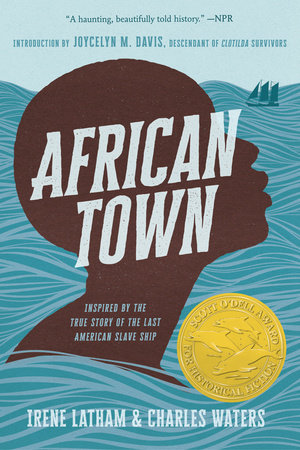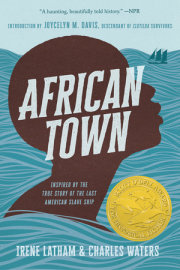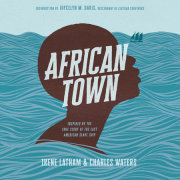KOSSOLA
Our Story
Be still, my children. Listen with your ears
and your heart. Our story starts with this
mark on my right cheek, these chipped teeth.
See? This is how you know I am who I say I am.
De town where I was born is called Bantè.
It’s nowhere near here, not in African Town, not
in Alabama. This town’s way across de ocean,
on de west coast of Africa in de kingdom
of Dahomey. My family’s home was a round,
two-story adobe with a terrace. Surrounded by hills,
about eight days’ walk to de sea. Someday maybe
you will see de world de way I have seen it
in Bantè. Then you will know how de sun
kisses de earth, melts like honey over de land—
it’s no wonder I believed all of life would be
bright and sweet. No wonder it still shocks me
that de world can be so hard, so dark.
But that darkness, it brought me here.
It brought you here. This is our story.
KOSSOLA
Market Day
My favorite day of de week is market day.
De market sits right in front of de king’s
compound, which is located near de center
of Bantè. Villagers come from miles around,
passing through de eight gates in de tall
solid walls that enclose our town on all sides,
like a fortress. Dey come to buy goats, cows, yams,
fried wàrà, fùfú, palm roots, and yards of lace.
“Hurry up, ọmọ mi,” my ìyá sings in Yorùbá,
like I’m still a child. She says I’ll always be her
precious boy, even though I’m eighteen years
old now. “Your bàbá and bàbá àgbà
said you must rope the goats.” I come from
a family of farmers—not royalty, but rich enough
to own our own animal herds. On market day,
all of us older children help out while
de younger ones race between de stalls
and bang homemade drums. When there’s a lull,
I sneak away to find Adérónké̩, who waits for me
at de trunk of a mahogany tree. “Watch where
I put my feet,” she says, scrambling higher
before my eyes can find her first foothold.
Her laughter rains down on me, soft
and shimmery. Teasing me, challenging me.
I grunt with my efforts, and when I slip,
I try again and again until I make it.
Together we watch de market from above,
two bright birds singing our own song
until de sun drops behind Bantè’s walls
and de other villagers head for home.
“A good day,” Bàbá àgbà says. We carry
only three cases of palm oil and two goats
back home. When I grab hold of de goats’
head-ropes, Bàbá àgbà puts a hand
on my brother Tayo’s shoulder. “Stay close,”
he says, “or I will sell you to the Portuguese
for tobacco.” Bàbá àgbà’s eyes sparkle,
but his fingers hold firm. I throw my shoulders back,
keep my voice light. “Why would dey want Tayo,
when dey can have me?” We’ve all heard stories
about people getting snatched by King Glèlè’s
soldiers and being sold to traders who carry them
across de sea. But that doesn’t happen
in Bantè, with our walls and gates and families
all looking out for one another. Besides,
Bàbá àgbà doesn’t even like tobacco.
Bàbá àgbà’s cheeks lift, and he gives me
a playful shove. “Those traders don’t want you,
Kossola. You talk too much.” De goats follow
as Tayo and I pull ahead of Bàbá àgbà,
but not too far ahead.
TIMOTHY
Master of Disguise
As the sun drops, I turn over the wheel of the Roger B. Taney
to my first mate so I can dress for dinner. Soon I’ll join
my guests for drinks, smoking, and chatting. Oh, how
I love being on the water! Gives a man
a chance to dream, and to count successes.
And there have been many since I’ve moved to this state some
twenty-four years ago. Since then, me and my brothers Jim and Burns
dominate the shipping routes in Alabama. Our ancestors would
be dancing with pride.
As I gallop toward fifty years old, I’ve given my family’s
name dignity—for my sweet, young wife, Mary, who isn’t
but half my age, for our future children, and for my brothers, too.
As I enter the dining room, my guests greet me with respect.
“Good evening, Captain Meaher,” they say.
“Evenin’, everyone,” I reply, tipping my hat.
I may be Irish by nationality, and a Mainer by birth,
but when necessary, I can transform myself into
either a Southern swashbuckler or a Southern gentleman,
depending on what’s needed.
KOSSOLA
Dreaming of Orò
For four years I’ve been training
to be a soldier, getting ready for my
initiation into orò, de highest level
of our Yorùbá religion. “I’m ready now,”
I tell Bàbá. He shakes his head.
“Soldier first. You must earn orò.”
He hands me de spear, shows me again
how to settle my weight into my thighs,
reminds me to use my sight. “Keep your
eyes open, and the spear will follow.”
I drop into de proper stance, but my mind’s
stuck on orò. I want to be part of de secret
society of men right now. I don’t want to wait
for de elders to say I’m ready. I am ready.
No one’s more respected than de orò.
Dey decide which punishment fits which crime.
De king may have ultimate say,
but even he listens to de orò. I want to know
what it’s like to sit in de woods for days
with fellow orò, deciding de fate of others.
I want to know that kind of respect and power.
Even de market shuts down and waits
for de orò’s return. “Higher,” Bàbá instructs,
and I lift de spear. If I can’t make de years pass
any faster, at least I’ve got this time alone
with Bàbá. Perhaps I can impress him,
convince him I’m ready. My eyes zero in
on de target, and I heave my spear.
TIMOTHY
The Bet
The smoky room turns from laughter to seriousness
faster than a water-wheel when our conversation spins
to Congress’s refusal to reopen the international slave trade.
I pound my fist on the table. “How do they expect us
to make a living? We need slave labor, and we need it cheap.”
The gentlemen nod their heads, and talk
swings to the possibility of our state, and others,
seceding from the Union. “We should secede,” I argue.
“Handle our own slave trade, set our own prices.
It’s the only way to turn a profit.”
Mr. Deacon, a businessman from New York City,
shakes his head. “Well,” he says, “until that happens,
the threat of being lynched will disabuse anyone of
notions about bringing slaves in illegally.”
I cough his words away. “Deacon,” I say.
“You put more faith in the government
than I do. No one’s going to lynch me.”
Mr. Ayers, another Northeasterner, who specializes
in the production of pills, pipes up. “You can’t bring Africans
within sniffing distance of America without being caught.”
Mr. Matthews, a Louisiana farmer of the highest order,
shouts, “Of course it can happen. Matter of fact,
I’ll bet you all a hundred dollars!” Well, that gets my attention.
“Gentlemen,” I say, my voice ominous as a windless sky.
“I’ll wager you all a thousand dollars
that I can smuggle a good number of slaves back
to Mobile without the authorities knowing about it.”
The room erupts with shouts and laughter,
before we all shake hands to seal the bet.
Hang me? Let the government try.
A bet is a bet—and I aim to win.
Copyright © 2022 by Irene Latham and Charles Waters. All rights reserved. No part of this excerpt may be reproduced or reprinted without permission in writing from the publisher.







